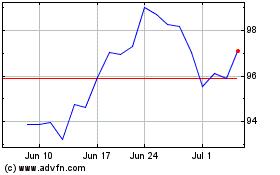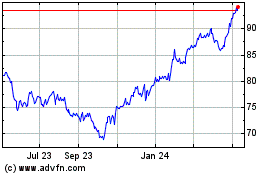Venezuela's Business Sector Awaits Word On New Price Caps
February 03 2012 - 1:17PM
Dow Jones News
The repeatedly delayed release of new limits on prices for many
consumer items in Venezuela has stirred uncertainty in the
country's business sector as producers, importers and shopkeepers
wait to assess the impact of recently expanded government
controls.
Authorities promised but failed to unveil by Dec. 15 the first
wave of adjustments linked to Venezuela's Law of Fair Prices and
Costs, passed in 2011. The list was slated to include 19 items,
mostly personal-hygiene and household-cleaning products, which have
been under a price freeze since November pending the
announcement.
The first deadline came and went, as did rescheduled release
dates in January and earlier this week. Meanwhile, with approaching
elections amplifying Venezuela's deeply polarized politics,
President Hugo Chavez has signaled to his support base among the
nation's poor that he will sharply cut prices across a wide swath
of the economy.
"Businesses are faced with a huge unknown," said Robert Bottome,
editor of the Caracas-based business journal VenEconomy and a vocal
Chavez critic.
Late Thursday, Chavez said during a televised address that
officials had analyzed production costs and average retail prices
of the targeted goods. Among the products named last year were
soap, detergents, paper towels, toilet paper, diapers and bleach.
"So we are going to make this announcement," Chavez said. "But not
yet. We are still studying."
The socialist leader, seeking re-election in October, did assure
his gathered supporters that he was going to slash their shopping
bills and punish greedy businesses. "The prices are going to go
lower," he said to cheers. And if met by resistance from any
individual firms, "we will nationalize the company. I have no
problem with that," Chavez said.
As part of the new law, officials created a national agency,
known as Sundecop, to examine the cost structures of companies and
determine what the government deems as reasonable profit. Chavez
has fixed prices on several basic goods and services--including
food staples and gas--for some time now.
But the leftist leader has said that additional, far-reaching
restrictions were needed to combat the price-gouging and product-
hoarding of his enemies in the private sector, whom he accuses of
seeking to destabilize Venezuela under orders from Washington.
Chavez blames these "little Yankees," as he calls them, and past
administrations for Venezuela's chronic shortages of goods and
notoriously high inflation rate, which approached 28% at the end of
2011.
"To the best of our knowledge, this price-setting mechanism is
unprecedented," analysts at Bank of America Merrill Lynch said in a
recent research note. "The delays are not surprising given the
highly complex nature of the task, which involves price structure
revisions of more than 16,000 firms."
Companies that faced audits in connection with the first
installment of revised prices include local units of multinationals
like Colgate-Palmolive Co. (CL), PepsiCo Inc. (PEP), H.J. Heinz Co.
(HNZ), Coca-Cola (KO), Johnson & Johnson (JNJ), Unilever PLC
(UN, UL) and Nestle (NSRGY, NESN.VX), as well as local food
distributor and packager Alimentos Polar.
The wait has unsettled Venezuela's business leaders, who have
long complained that existing price controls force them to operate
at a loss and contribute to the economic imbalances. The
president's statist policies and his expropriation of more than
2,000 companies, properties or other private sector assets, critics
say, have led to the flight of private investment and the decline
of food production and manufacturing. Venezuela imports more than
70% of its food.
The Law of Fair Prices and Costs will only magnify the
distortions, said Mauricio Tancredi, a vice president for
Consecomercio, one of Venezuela's main business associations. "If
they are looking to battle inflation and shortages, what they are
going to achieve is the opposite," he said.
Some analysts believe that Chavez will approve a mild set of
initial price ceilings and not risk any possible adverse effects of
the law as he seeks re-election. "The law is politics more than any
other thing," said economist Angel Garcia Banchs, director of the
local research house, Econometrica. "It's meant to blame the
private sector for inflation."
With a new term in hand, however, Chavez will seek to deepen
socialist changes in Venezuela, Garcia Banchs said.
"If Chavez wins, we do believe that the Law of Prices and Costs
will really be applied," he said.
-By Ezequiel Minaya, Dow Jones Newswires; 58-414-120-5738; ezequiel.minaya@dowjones.com
--Kejal Vyas contributed to this article
Colgate Palmolive (NYSE:CL)
Historical Stock Chart
From May 2024 to Jun 2024

Colgate Palmolive (NYSE:CL)
Historical Stock Chart
From Jun 2023 to Jun 2024
